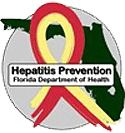It's a New Day in Public Health.
The Florida Department of Health works to protect, promote, and improve the health of all people in Florida through integrated state, county, and community efforts.
Hepatitis B Information
Florida Department of Health in Pinellas County, Available 24 hrs/day
Modes of Transmission
Hepatitis B is found in blood, seminal fluids, vaginal secretions, and other body fluids. The virus can be spread by:
- Unprotected sexual contact with an infected person, especially among persons with multiple sex partners or men who have sex with men (MSM)
- Contact with contaminated needles, especially injection drug equipment. Other items such as tattoo and body piercing instruments, razors, and toothbrushes may be contaminated with infected blood
- An infected mother to her infant during delivery
- Household contact with an infected person
- Occupational exposure through accidental needle stick
The hepatitis B virus is not an airborne virus, and is never transmitted through casual contact such as coughing, sneezing, being in the same area as an infected person, or by consuming contaminated food or water.
Symptoms
The incubation period for hepatitis B is 6 to 24 weeks, with an average of 8 to 12 weeks.Acute Hepatitis B

- Jaundice
- Dark urine
- Light stool
- Fever
- Nausea
- Vomiting
- Fatigue
- Abdominal pain
- Anorexia
Chronic Hepatitis B
Chronic hepatitis B refers to an infection where the body is not able to eliminate the virus. About 90% of those infected by hepatitis B as children and 10% of those infected as adults will develop chronic hepatitis B, which may lead to cirrhosis and cancer of the liver. Patients that develop severe liver damage may need to undergo liver transplant surgery to replace the damaged liver with a healthy one. People with chronic hepatitis B remain infectious throughout their lifetime, unless successfully treated.Testing
| HbsAg | Anti-HBs | Anti-HBc IgM | Anti-Hbc IgG | Interpretation |
|---|---|---|---|---|
| + | - | - | - |
|
| + | - | + | + |
|
| + | - | - | + |
|
| - | + | - | + |
|
| - | - | + | - |
|
| - | - | - | + |
|
| - | + | - | - |
|
Treatment
There are two medications available to treat chronic hepatitis B:
- Interferon (IFN): given to patients who have an infection lasting greater than 6 months, with elevated liver enzymes, and actively dividing virus in their blood. Approximately 40% of patients will respond to the therapy.
- Lamivudine is taken by mouth once a month, and the treatment lasts for one year. It is sometimes given as a combination therapy with IFN. Approximately 40% of patients treated with Lamivudine will respond to the therapy.
Vaccination and Prophylaxis
Hepatitis B vaccination is recommended for:
- Adults in one or more of the high risk groups
- Children 0 – 18 years of age
- Persons with compromised immune systems (e.g., HIV/AIDS)
- Persons with chronic liver disease or chronic hepatitis C
- Inmates of long-term correctional facilities
There are two types of products available for prophylaxis and prevention of hepatitis B infection:
- Hepatitis B vaccine provides long-term protection against HBV infection, and is used for both pre-exposure and post-exposure prophylaxis. There are three doses of the vaccine; the second dose is given 1 month after the first, and the third dose is given 6 months after the first.
- Hepatitis B Immune Globulin (HBIG) provides temporary protection against the hepatitis B virus for 3 – 6 months, and is used only in certain post exposure settings.
Pregnancy and Perinatal Issues
Pregnant women who have the hepatitis B virus can pass the virus to their baby during delivery. Without any intervention, 85-90% of the babies born to hepatitis B positive mothers will become chronically infected with the virus.
Screening:
- All pregnant women should be tested for hepatitis B, which should be done at the same time as other prenatal tests.
- If a woman tests positive (has HBsAg in her blood), the newborn should receive HBIG along with the hepatitis B vaccine.
Vaccination:
- All newborns born to a hepatitis B positive mother must receive HBIG and the first dose of the hepatitis B vaccine within 12 hours of birth
- The second dose is a given 1 month after the first dose, and the third dose is given at 6 months after the first
- The infants should be tested for immunity, upon completion of the vaccine series
Note: As part of routine childhood vaccinations, it is recommended that all infants be immunized against hepatitis B starting at birth, regardless of mothers hepatitis B status. However, this routine immunization series does not include the dose of HBIG.
Breastfeeding:
Women with hepatitis B can breastfeed, provided that the baby receives HBIG, and the first dose of the vaccine within 12 hours of birth, and receives the other two doses of the vaccine on schedule.



Connect with DOH